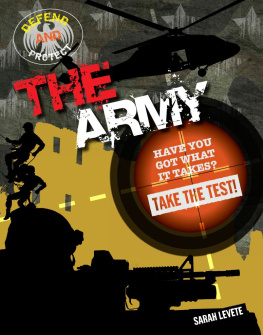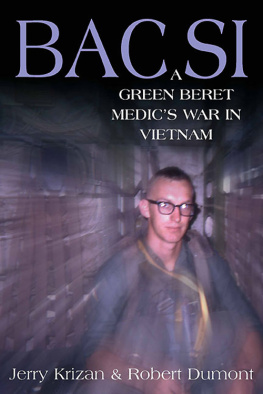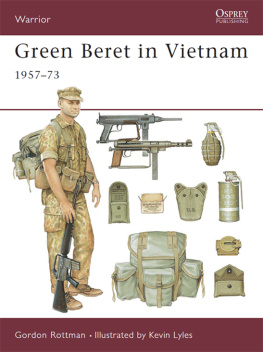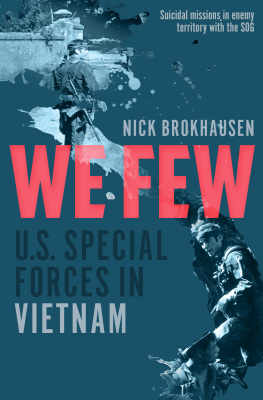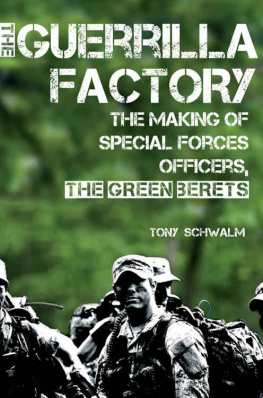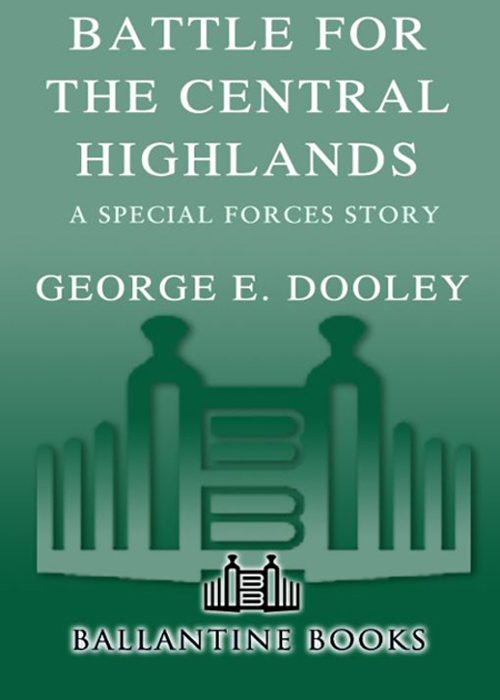
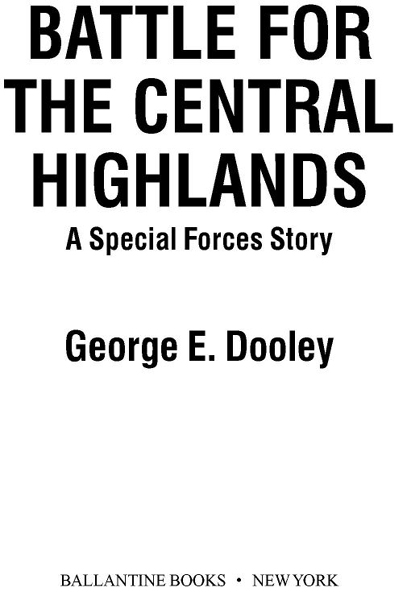
Table of Contents
To Nina Smith, my wife; and Ed Sprague
my two best friends.
And to all the 5th Special Forces Group (Airborne)
KIA and MIA. We still remember.
He which hath no stomach to this fight,
Let him depart; his passport shall be made,
And crowns for convoy put into his purse:
We would not die in that mans company
That fears his fellowship to die with us....
He that shall live this day, and see old age,
Will yearly on the vigil feast his neighbours,
And say, To-morrow is Saint Crispian:
Then he will strip his sleeve and show his scars....
This story shall the good man teach his son;
And Crispin Crispian shall neer go by,
From this day to the ending of the world,
But we in it shall be remembered,
We few, we happy few, we band of brothers;
For he to-day that sheds his blood with me
Shall be my brother; be he neer so vile,
This day shall gentle his condition:
And gentlemen in England now a-bed
Shall think themselves accursd they were not here,
And hold their manhoods cheap, while any speaks
That fought with us upon Saint Crispins day.
William Shakespeare, King Henry the Fifth
Acknowledgments
Books arent written alone. A lot of people end up helping even though they may not be aware of it. A few of the many who helped me are:
Max Lund, my friend from Michigan, who provided most of the detail given in chapter 15. Max also assisted in describing what Ed Sprague was doing in the early seventies. Max would have made a good Special Forces soldier if hed had the inclination.
Jim Steele for convincing me not to quit writing and for putting me in touch with Owen Lock at Random House. In many respects, Jims short career mirrored a Special Forces tour but without the benefits and support. Jim is another person who would have made a good SF soldier.
John Southworth gave me more information than I could hope to use about Ed Sprague, particularly about Ed Sprague and his team on a winter training exercise in Norway. Maybe the material can be used in another manuscript.
The members of Chapter 73, Special Forces Association. Every few months, I need to get back with real men, men with honor and values who have proved their worth. They give me that.
Amy Olson provided some of her computer skills and artistry. She patiently taught me the subtleties of Quark and Adobe Photoshop. Dave Buckner acted like a proper English teacher and corrected my grammar.
Finally, the folks at Enfield who keep me engaged.
About 1400 hours that afternoon, John Hennigancalled me back to Kontum. We now had assigned B-52strike plots and times, along with an insertion pointand time for the Mike Force battalion. Everything wasgoing to happen between 0700 and 0900 hours thenext morning, 03 April. I was selected to bring the newsto Dak Seang and to make sure that the camp heldthrough the night. There was still real worry that theNVA might try to take the camp, and we couldnt allowthat to happen.
Before I left to prepare for a combat assault into DakSeang, Lieutenant Colonel Hennigan talked to me. Hetold me that I was his direct representative on theground and that if I felt it necessary, I could relieve thedetachment commander and assume command myself.We agreed that I wouldnt tell the A-245 commanderof my authority, but if I had to assume command,Lieutenant Colonel Hennigan would back me up byradio. I thought that that would be the most seriousstep I could expect to take, but it could only be a lastresort. Relieving the commander of a team that hadbeen continually fighting for thirty-six hours wouldheavily impact morale....
Books published by The Ballantine Publishing Group are available at quantity discounts on bulk purchases for premium, educational, fund-raising, and special sales use. For details, please call 18007333000.
Preface
Ive always been intrigued about the difference between history and story in English. Learned scholars write history, while people who experienced it and were there write stories. I was there during some of the Vietnam Central Highlands fighting and dont recognize the official history that has since been written. In German Geschichte means both history and story/tale.
This is my Geschichte.
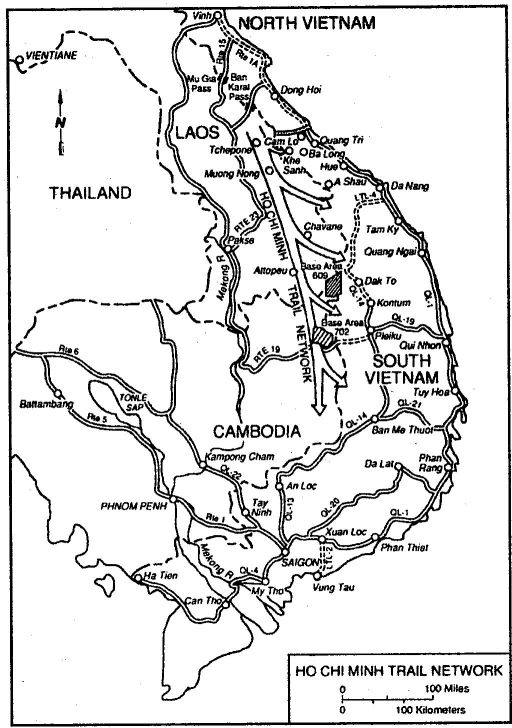
Prologue
It was good to see the guys once again.
Some were heavier, some balder, and some grayer. All were older. Yet this crowd was different from a gathering at a typical sales convention or industrial show. Sure there were wives and girlfriends among them, but the men still seemed distinct. They werent boisterous or loud but projected an air of confidence. How do you put your finger on that undefinable quality that made those men unique?
Ed Sprague was there, surrounded by friends and family, a minigroup within the larger crowd. Ed looked distinguished and healthy, talking to others in his deep, south-Boston accent. He looked as he always did, like a kindly old uncle whom everyone liked. Nobody meeting him for the first time would recognize a man who retired as an army master sergeant and went on to a second career with the State Department, finally retiring at ambassadorial rank as an FSO-1. Nobody would recognize him as a ferocious warrior responsible for the deaths of hundreds of Viet Cong in the Central Highlands of Vietnam during the 1960s and 1970s. Perhaps the presence of Ed and the others in the reception room combined to create a noticeable aura that indicated this group was different from others.
Jim Stewart was there with his wife, Cara. Jim spent twenty years in Special Forces and related duty. Quiet and unassuming, few would guess that he was one of the original soldiers who joined Special Forces. Even fewer know about his covert assignments. Jim doesnt look like a Rambo, but a Rambo doesnt survive in the real world of special operations.
The annual Special Forces Association convention was taking place, as it does in a different city every year. Many former Special Forces soldiers go to every convention; others just periodically visit. The primary bonds of those men reached back to mutual worldwide service during the Cold War of the fifties, sixties, and seventies. Some of the men had trained the Cuban guerrillas that had harassed Fidel Castro for thirty years; others had a part in the elimination of Che Guevara as an insurrectionary threat in Latin America; and still others had worked in classified missions in Europe and other parts of the world. Some had assisted the Afghanistan rebels to defeat the Soviet Union. The most common bond, however, was service in Southeast Asia during the Vietnam War, where almost every Special Forces soldier had at least one tour, and most had multiple tours in Vietnam or Thailand. Many of those men had clandestine time in Cambodia, Laos, and North Vietnam.
But still, what makes that group and gathering exceptional? To explain, we have to look back at the events that caused the formation of Special Forces.
When the Office of Strategic Services (OSS) was formed by Col. William Wild Bill Donovan in World War II to conduct unconventional warfare in Europe and Asia, the founders had to search throughout the entire armed forces to find capable people. Then the recruits had to be trained in languages, clandestine communications, guerrilla warfare, sabotage, espionage, demolitions, and the other requirements of unconventional warfare. After first finding candidates with foreign language skills, the OSS trained them with the skills that they would need to operate behind enemy lines, including parachuting as a means of infiltration. The OSS did remarkably well in World War II and was promptly disbanded when the war ended. But the unconventional warfare mission requirements didnt go away. In fact, after World War II, the mission requirements increased in direct proportion to Soviet subversion throughout the world.
Next page

